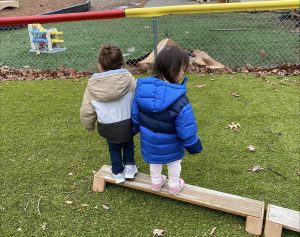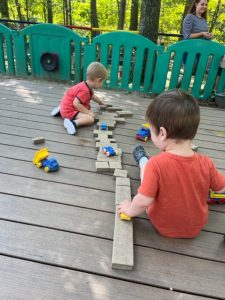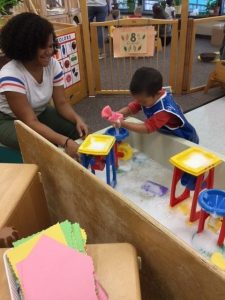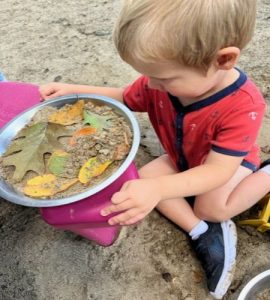The Toddler years are an exciting time of self-discovery and exploration of the world. Growing out of infancy, children actively experiment with how to manipulate their environment to suit their own needs. It is typical for toddlers to want to do things for themselves, yet want help from adults when frustrated. They tend to use their emotions and behaviors in creative ways to show their power and control. This back and forth relationship between doing for one’s self and needing others is embraced in its uniqueness in the Toddler Program.
The Toddler environment is designed to offer choices and foster independence. Children are free to move about the room engaging in play-based interest areas that support social, emotional, physical, language/communication and cognitive areas of learning. Spaces are divided into areas such as dramatic play, blocks, reading, writing, manipulatives, are, and sensory. The creative use of low shelving, see through panels, and felt boards allows spaces to be separate yet have the feeling of coziness and security that toddlers need to feel safe while playing.
Three professional staff, student teachers, field-work students, and student workers support play with small groups of children (up to 8 children in any one space). This allows Toddlers to explore individual interests as well as experiment with social situations. As Toddlers explore, the staff purposefully observes and plays with your child to see how he/she engages with materials, reacts to their surroundings, other children and adults. Using this information, the teachers plan key experiences that support growth in your child’s emotional, social, physical, linguistic and cognitive learning. These plans are shared with all student staff during their weekly training sessions so your child receives consistency and continuity of care. The curriculum is child-focused and driven by the interests, developmental abilities and needs of each individual Toddler.
As Toddlers experiment with social relationships, it is the teacher’s role to support each child’s individuality and help them negotiate in the social world around them. As emerging friendships form, conflict situations become an opportunity for learning. Teachers provide positive redirection and feedback for learning or for social behaviors they hope to facilitate. Further, they attempt to integrate a “choice” situation into as many interactions with children as possible to fulfill the Toddler’s need for autonomy.
Classroom routines such as diapering, toilet learning, lunch, clean-up times, and napping are not rushed transitions. These are those “Prime Times” for learning and building trusting relationships with each other. These routines are an important part of our everyday learning environment.



